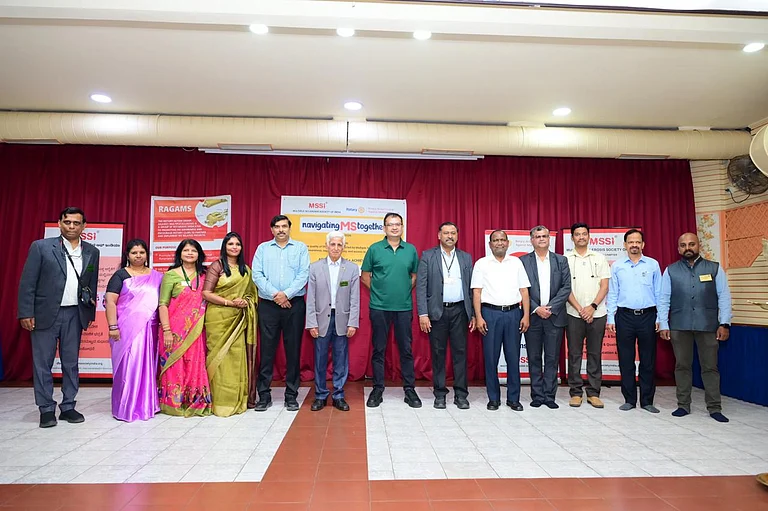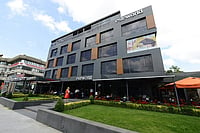In a milestone event to celebrate its 10th anniversary, Regal Hospital introduced the revolutionary Rezum Water Vapour Therapy during a Continuing Medical Education (CME) session, in association with the Indian Medical Association (IMA) Yelahanka. Attended by over 150 doctors, the event aimed to educate medical professionals on this new, minimally invasive treatment for Benign Prostatic Hyperplasia (BPH). Dr. Suriraju V, a renowned urologist, delivered a key presentation, sparking widespread interest and discussion among the attendees. Below is an exclusive interview with Dr. Suriraju, where he sheds light on the significance of Rezum therapy and the impact it could have on men's health.
Q1. Dr. Suri Raju, Rezum Therapy is an exciting development in prostate health. For those unfamiliar, can you explain how it works and how it stands out from traditional treatments for benign prostatic hyperplasia (BPH)?
Dr. Suri Raju: Absolutely. Rezum Therapy represents a groundbreaking approach to treating BPH, which affects millions of men worldwide, especially as they age. Traditionally, treatments for BPH ranged from medications that alleviate symptoms to more invasive surgical options like TURP (Transurethral Resection of the Prostate), which physically removes excess prostate tissue. The challenge with these treatments is that they either come with side effects like sexual dysfunction, or they require long recovery periods.
What makes Rezum Therapy different is its minimally invasive nature. The procedure uses water vapor (steam) to shrink the enlarged prostate. During the treatment, thermal energy from the water vapor is delivered into the prostate tissue, where it disrupts the cells. Over time, the body naturally absorbs this excess tissue, relieving the pressure on the urethra and allowing for normal urine flow. This process typically takes 15 minutes, and what’s really impressive is that it’s performed on an outpatient basis, meaning patients can go home the same day. Research shows that most men experience symptom relief in as little as two weeks, and the long-term data suggests that improvements last for five years or more.
Q2. Rezum Therapy is relatively new in India. How do you see it benefiting patients, particularly in Karnataka and the broader Indian healthcare system?
Dr. Suri Raju: Rezum is revolutionary, particularly for a country like India, where access to cutting-edge medical technology is often limited to urban centers. For many men in Karnataka and across India, BPH is a daily challenge that can severely impact their quality of life. The biggest advantage of Rezum is its accessibility and quick recovery time, which makes it ideal for men who may not be able to afford long hospital stays or take extended time off work.
In Karnataka specifically, there’s been growing awareness about men’s health issues, including prostate conditions. What’s really promising about Rezum is that it bridges the gap between the need for effective treatment and minimizing the risks associated with surgery. For instance, it’s a safer option for high-risk patients, like those who have undergone angioplasty, bypass surgery, or are on blood thinners. For these men, stopping their medications for surgery can be dangerous, but with Rezum, that’s not necessary since it’s a minimally invasive procedure with low risks of bleeding.
India is facing an increasing number of BPH cases as our population ages, and this therapy offers a groundbreaking solution to address it across both urban and rural settings. It’s an exciting time for urology care in India because we’re finally able to offer men a treatment that doesn’t come with the trade-offs that older surgical methods carried.
Q3. Can you share more about the success rate of Rezum Therapy and how it compares to other prostate treatments?
Dr. Suri Raju: Rezum Therapy has shown overwhelmingly positive results in clinical trials and real-world applications. Studies indicate that more than 90% of men report significant improvements in BPH symptoms after undergoing the procedure. For example, issues like frequent nighttime urination, weak urine flow, and incomplete bladder emptying are significantly reduced within just a few weeks of the procedure.
What’s more, long-term studies suggest that the improvements last at least five years, with very few patients requiring additional treatment during that time. Comparatively, invasive surgeries like TURP can have similar success rates, but the risks of complications—such as sexual dysfunction, urinary incontinence, or even longer recovery periods—are much higher. With Rezum, men have a significantly lower risk of these side effects, which makes it a compelling first-line treatment for BPH.
At Regal Hospital, where we recently celebrated our 10th Anniversary, we shared these success stories with our colleagues from the IMA Yelahanka to spread awareness among the medical community. The more doctors who understand the benefits of Rezum, the more men we can help by offering this advanced, safe treatment option.
Q4. You mentioned that high-risk patients, like those on blood thinners or who have undergone angioplasty, are ideal candidates for Rezum. Could you explain why this is the case?
Dr. Suri Raju: Rezum Therapy is particularly well-suited for high-risk patients, especially those with underlying heart conditions or who are on blood thinners. One of the main advantages of Rezum is its minimally invasive nature, which involves low fluid absorption and makes it safer for cardiac patients. For those with low ejection fractions or cardiovascular issues, this is especially important because reducing the fluid load on the heart during procedures minimizes the risk of complications.
At Regal Hospital, we’ve successfully performed Rezum procedures without stopping blood thinners, and the outcomes have been very encouraging. While there is always a small risk of puncture-related bleeding when the delivery device is used, the bleeding typically doesn’t come from the prostate gland itself. In our experience, these minor complications have been manageable, and our patients have responded well post-procedure.
What makes Rezum ideal for this population is that it’s a short procedure, and the body absorbs minimal fluid, which helps in reducing the overall cardiac strain. Long-term studies are still needed to further evaluate the outcomes for high-risk patients, but so far, the data and our hands-on experience are very promising. This opens up new treatment possibilities for men who may not have been considered candidates for traditional surgery.
Q5. With so many exciting advancements in men’s health, where do you see Rezum Therapy fitting in the future landscape of prostate treatment in India?
Dr. Suri Raju: I believe Rezum Therapy is going to play a pivotal role in how we manage prostate health in the future. Men’s health has traditionally been under-discussed, and many men delay seeking treatment for conditions like BPH because they fear invasive procedures. Rezum changes that narrative. It offers a low-risk, high-reward solution that doesn’t compromise on effectiveness.
Looking ahead, I see Rezum becoming the first-line treatment for BPH, especially for younger patients or those with mild to moderate symptoms. It’s safe, effective, and has a much shorter recovery period than traditional surgeries. As the procedure becomes more widely available across India, I’m confident that we’ll see a shift where fewer men opt for invasive surgeries like TURP unless absolutely necessary.
For healthcare professionals, it’s about embracing these innovations and offering patients the best possible care. At Regal Hospital, we’ve already made significant strides in that direction, and I’m proud to be part of a team that’s pushing the boundaries of men’s health in India.


























